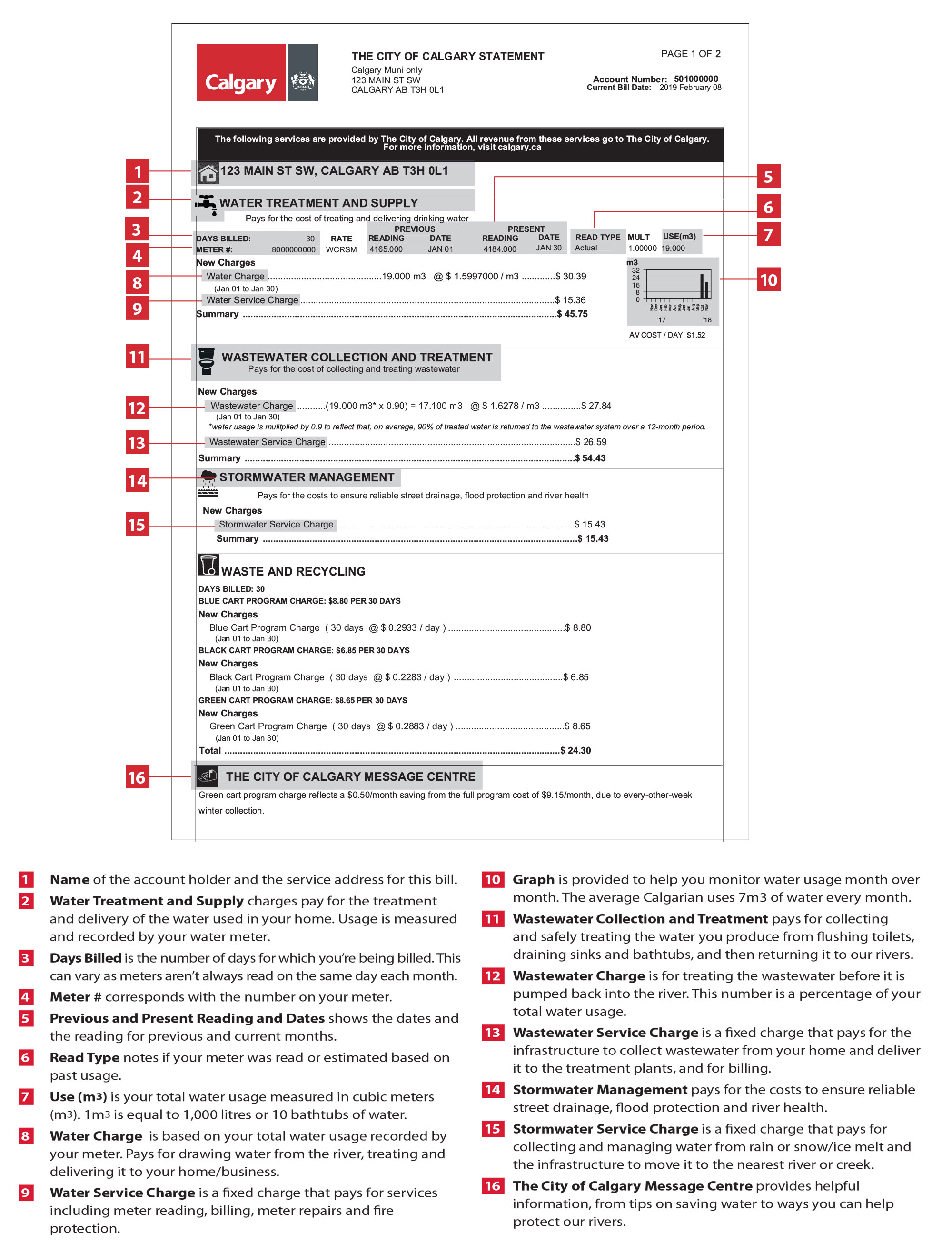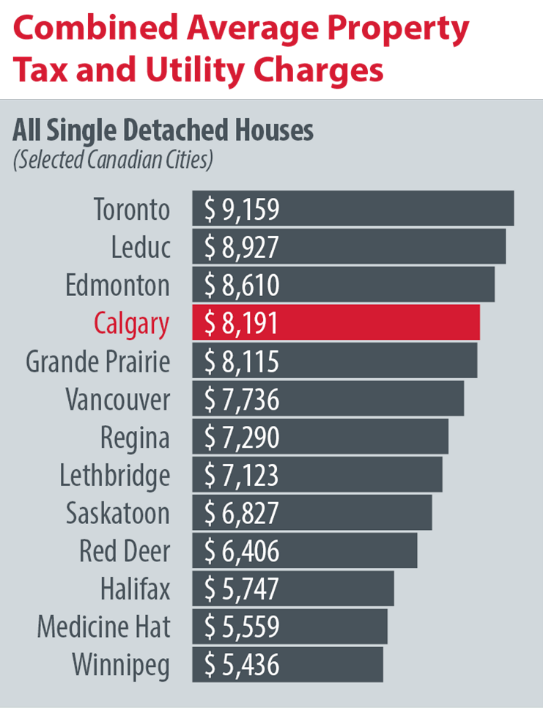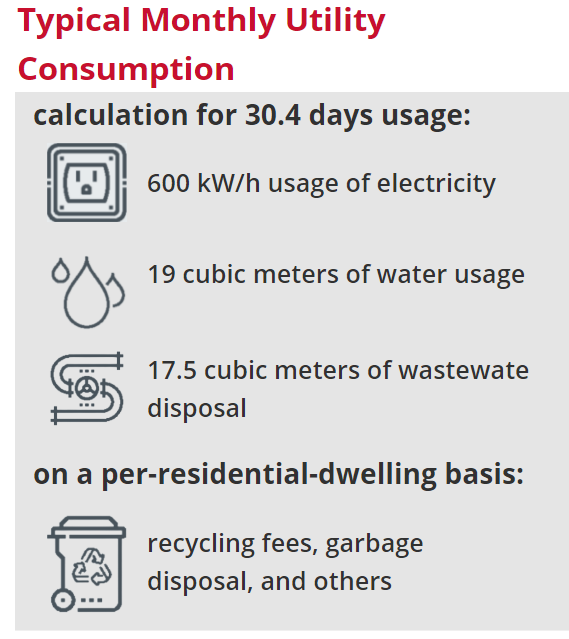Understanding your water utility bill & water rates
Delivering safe and reliable drinking water, treating wastewater, providing flood protection and maintaining a system of pipes, plants and pumps for a city of 1.3 million is complex.
Reading your water utility bill shouldn’t be.
On this page you can learn more about how to read and understand your water utility bill, find answers to your most common questions and learn about the services listed on your bill.
Customer service
Questions or concerns about your water utility bill?
Please visit the ENMAX Customer Care Centre or contact 310-2010. ENMAX is The City's contracted customer care, billing and meter reading provider.
Need a new account?
See how to set up a new water account, visit Accounts and Billing.
How to read your water utility bill
Questions you may have about your bill
Why does my bill fluctuate from month to month?
For all customers: your bill may fluctuate depending on the number of days billed for in a payment period.
For customers with water meters: your bill will also fluctuate based on the amount of water you have used.
Why does the number of days I am billed for vary?
The number of days you are billed for may vary as meters aren’t always read on the same day each month. However, it is typically between 28 and 30 days.
Why do I pay more for wastewater than water?
Turning river water into safe drinking water has a cost, but Calgary is fortunate to have clean water sourced from the nearby Bow glacier. The source water doesn’t require as much cleaning treatment as wastewater.
It costs The City of Calgary more to collect wastewater from residential homes and commercial locations and then treat this wastewater to remove solids like feces, dishwasher food particles, etc., and return the treated water safely to the Bow River.
Is my water use “normal”?
The average Calgarian uses 7m3, or 7,000 litres, of water every month. While a family of three can expect to use 19m3, or 19,000 litres, of water every month.
For tips on how you can reduce your water use, check out saving water in your home and the Homeowner Water Guide.
How do you determine how much water I use?
Metered customers
If you are a metered customer as water travels into your home or business, it is measured and recorded by your water meter and your Water Charge and Wastewater Charge are then calculated based on that usage.
Learn how to read your water meter here.
Flat rate customers
If you are a residential customer on a flat rate, your water charge is determined by the size of both your lot and your residence.
How can I be sure my water meter is accurately measuring the amount of water I use?
The City uses water meters that meet industry standards. Water meters are mechanical devices – water needs to pass through the meter in order to record use. To certify the meter’s accuracy, all meters are tested by the manufacturer at three different flow rates.
We are also one of the only municipalities in Canada to own a state-of-the-art Water Meter Test Bench manufactured by MARS Company, an industry leader in meter testing technology.
My bill says ‘estimated’ under Read Type. What does that mean?
If you are a metered customer your water meter records how much water you use, and your Water Charge and Wastewater Charge are then calculated based on that usage. When you receive your bill, it shows what the meter reading was and whether it was an actual reading or an estimated meter reading.
If we cannot obtain a meter reading, your usage is estimated based on past use. This is referred to as an estimated meter reading. The next time the meter reader is able to get a reading, your next water bill is updated with the actual data and you may notice some minor adjustments to your charges in order to reconcile any difference.
If you have received an estimate and would like to submit a reading, please contact ENMAX at 403-310-2010. You can also submit a meter reading to ENMAX online.
My bill is significantly higher than usual - what can I do?
If you receive a bill that is higher than expected, it could be the result of an undetected leak.
The first step we recommend is to work through our high consumption checklist. This guide can help you troubleshoot causes of high water consumption.
If a cause cannot be found, please contact ENMAX at 310-2010 for further investigation. If you have received a water bill that is equal to or greater than three times your average bill for that season, call ENMAX as soon as possible.
Please note that it takes time to review each situation and work to find the cause of the high water use. Depending on call volume and length of time needed to investigate, there may be higher than usual wait times for you to have your specific situation reviewed.
What is the difference between usage rates and fixed charges?
There are two types of charges on your water bill: Usage and fixed.
Usage Rates
Water and Wastewater rates are variable. They are based on the amount of water your household consumes and returns to the system, multiplied by a rate.
Usage rates pay for the treatment of water and wastewater.
Fixed Charges
Water, Wastewater & Stormwater Service Charges are fixed charges – These are a flat fee based on 30-days and are not impacted by your water consumption.
What are the different rates and fixed charges? What do each of these cover?
For water treatment and supply
- Usage Rate: Pays for water consumption, including cooking, bathing, watering your garden and drinking. It pays for the cost of treating and delivering water to homes. A bill will reflect water usage times this per cubic meter rate. One cubic meter is equal to 1,000 litres, 220 gallons or 10 bathtubs full of water.
- Fixed Charge: Pays for services such as meter reading, billing, meter repair and providing fire protection.
For wastewater collection and treatment
- Usage Rate: Pays for the costs to treat wastewater produced from flushing toilets and draining sinks and bathtubs.
- Fixed Charge: Pays for wastewater collection pipes, three wastewater treatment facilities and billing.
For stormwater management
- Usage Rate: There is no usage charge for Stormwater.
- Fixed Charge: Pays for the operation and maintenance of the stormwater system which ensures reliable street drainage during rain events. It also funds upgrades for flood protection as well as protecting the river by reducing the amount of sediment entering the river
How does the wastewater calculation on my monthly bill work? Not all the water I use is returned to the wastewater system.
The wastewater calculation on your bill is based on the amount of water you use. On average, not all of the water you use in your home or business is returned to the system for treatment. The wastewater calculation takes this into consideration, charging you only 88 per cent (residential), 95 per cent (multi-family) and 90 per cent (business) of your water usage all year long. This percentage recognizes seasonal fluctuations in water use, like outdoor watering, when less of the water you use is being sent to the wastewater treatment plant.
How is a flat rate determined?
Water utility rates for residences on a flat rate are calculated according to the square feet of actual lot area and gross building area based on the original development permit submitted to The City of Calgary Planning Department.
Does the Water Utility profit from my rates and fixed charges?
The water utility does not profit from rate and service charge adjustments. Water utility rates and charges are set at the lowest amount possible to deliver current services, and expand, upgrade, repair and maintain the infrastructure so we can continue to deliver the and stormwater services you value.
The water, wastewater and stormwater services are entirely funded by rates paid by customers. The water utility does not receive any funding from property taxes.
How does The City of Calgary set rates and fixed charges?
Based on usage patterns, we divide customers into groups such as residential, business and multi-family. Your rates and service charges reflect the actual cost to provide your customer group with water, wastewater and stormwater services.
Rates and fixed charges are set at the lowest level possible to cover the actual cost of providing your water, wastewater and stormwater services and the required maintenance and upgrades to the system.
Every four years, The City undertakes a cost-of-service study to ensure planned rates are fair and equitable, and can provide the funding to deliver clean, safe water and reliable service for years to come.
Each year those proposed rates are reviewed, and adjustments made, to ensure they continue to cover costs and meet the needs of Calgary. Wherever possible savings are also applied, and proposed rates reduced.
How do I know rate and fixed charges are fair and consider Calgary’s economic situation?
Every four years, The City undertakes a cost-of-service study, with a third-party consultant, to ensure new rates are fair and equitable, and can provide the funding to deliver clean, safe water and reliable service for years to come.
Each year those proposed rates are reviewed, and adjustments made, to ensure they continue to cover costs and meet the needs of Calgary. Wherever possible savings are also applied, and proposed rates reduced.
How do Calgary's rates compare to other cities?
It is hard to compare cities, since each takes a different financial approach to taxes and utility costs, as well as how water, wastewater and stormwater are treated. For example, in Calgary, water, wastewater and stormwater treatment is fully funded by water rates. In some cities those same costs are paid for or subsidized by taxes.
The graphic below shows the average yearly cost of taxes and utilities, including electricity, water, wastewater, stormwater and waste & recycling services, for cities across Canada.
*Utility numbers were collected or calculated under these assumptions.
- “Typical” month consisting of 30.4 days
- 600 KW/H usage of electricity
- 19 cubic meters of water and 17.5 cubic meters of wastewater treatment
Other charges on a per-residential dwelling – recycling fee, garbage disposal, and other
What is happening to rates across major cities?
Rates and the price of water are going up across North America. A recent study of large North American cities found that water rates were increasing approximately six percent per year.
Even with the increase to Calgary’s water rates we will continue to pay less than a penny a litre for water and wastewater service.
Do my property taxes pay for water services?
No. Utility services are completely self-funded through water rates and service charges. There is no support from property taxes.
Can the billing of service charges be paused for extended vacancies?
No. Extended vacancy does not qualify as an acceptable reason to pause billing for water, wastewater, and stormwater service charges.
Service charges are a flat rate paid by all water utility customers regardless of the amount of water consumed, which cover the cost of infrastructure maintenance, meter reading and maintenance, billing, fire, and flood protection. They are in no way connected to water consumption or usage rates, which pay for the treatment of water and wastewater.
Some customers request their service charges be paused while on extended vacancy from their property. When applied, this practice was a form of preferential treatment to a small subset of customers and does not align with the Water Utility’s responsibility to fairness and equity to all rate payers.
Your monthly water bill pays for three important services
These services are entirely funded by rates paid by customers. The water utility does not receive any funding from property taxes.
Water Treatment and Supply
Treatment and delivery of the clean and safe water used in your home or business, which includes:
- Two water treatment plants
- Maintenance of over 5350 kms of water pipes
- Over 140,000 water quality tests
- Responsive field crews to address service interruptions
Wastewater Collection and Treatment*
Collecting and safely treating the water you produce from flushing toilets, draining sinks and bathtubs, and then returning it to our rivers, which includes:
- Three wastewater treatment plants
- Significant upgrades to our treatment plants to meet regulatory requirements
- Maintenance of over 7000 kms of wastewater pipes
- High quality water returned to our rivers
- Responsive field crews to address service interruptions
Stormwater Management*
Reliable street drainage, flood protection and river health, which includes:
- Protection from property damage
- Storm ponds that help protect our rivers from 30,000 tonnes of sediment
- Maintenance and improvements to the stormwater system
- Investment in flood protection and riverbank improvements.
* Wastewater and Stormwater services were previously shown under one heading (“wastewater and drainage”). In 2019, the services were separated on the bill to demonstrate that they are separate services.




